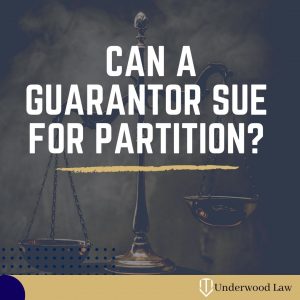 Unless the guarantor has an interest in the property, such as a joint tenancy, tenancy in common, or tenancy by the entirety, then no, a guarantor in the property can not sue for partition.
Unless the guarantor has an interest in the property, such as a joint tenancy, tenancy in common, or tenancy by the entirety, then no, a guarantor in the property can not sue for partition.
This seems complicated, but if you break down that a guarantor simply acts as collateral against a property mortgage, and those who are eligible to bring a partition action lawsuit must have an actual interest in the property, it starts to make more sense. Read on to find out more about how these two concepts interact in the world of real estate law.
 California Partition Law Blog
California Partition Law Blog

